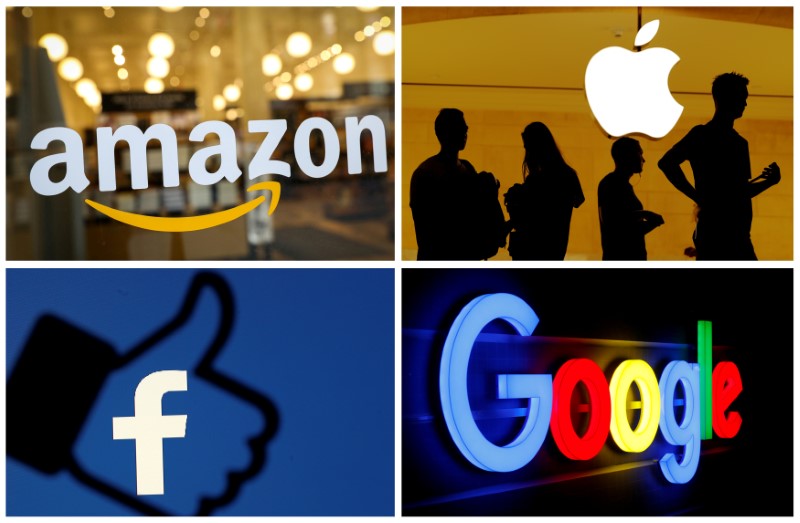By Nandita Bose
BOULDER, Colo. (Reuters) - In April 2019, Tile.com, which helps users find lost or misplaced items, suddenly found itself competing with Apple Inc (NASDAQ:AAPL), after years of enjoying a mutually beneficial relationship with the iPhone maker.
Apple carried Tile on its app store and had sold its products at its stores since 2015. It had even showcased Tile's technology at a big event in 2018. The startup had sent an engineer to Apple's headquarters to develop a feature with the company's voice assistant, Siri.
Then, in early 2019, Tile's executives read news reports of Apple launching a hardware product, along with a service that resembled what Tile sold. In June, Apple stopped selling Tile's products in its stores and has since hired its engineer.
The smart-tracker startup was one of four companies that testified at the latest hearing of the U.S. House Judiciary Committee's antitrust subcommittee in Colorado on Friday. The smaller companies are seeking to urge Congress to look at how big tech use their considerable clout to hurt rivals.
Similar investigations are underway at the Justice Department, at the Federal Trade Commission, and with a bipartisan collection of attorneys general from dozens of states.
"After thoughtful consideration and months of bringing our concerns to Apple through regular... channels, Tile has made the decision to continue raising concerns over Apple's anti-competitive practices," Tile's general counsel Kirsten Daru told Reuters in an interview ahead of the hearing.
An Apple spokesman said the company has not built a business model around knowing a customer's location or the location of their device.
In September, House lawmakers asked more than 80 companies for information about how their businesses may have been harmed by anti-competitive behavior from Apple, Amazon (NASDAQ:AMZN), Facebook (NASDAQ:FB), and Alphabet's Google (NASDAQ:GOOGL). In October, Committee Chairman David Cicilline said he expected to have a final report on its probe by the "first part" of 2019.
On Friday, Cicilline delivered a scathing statement against big tech. "Companies... both large and small, have found themselves dependent on the arbitrary whim of these platform giants, one algorithm tweak away from ruin," Cicilline said.
"Because their decisions are largely unaccountable, opaque, and result in sweeping consequences, the dominant platforms effectively serve as private regulators," he said.
PopSockets, a seller of collapsible phone grips, testified against Amazon. The company's chief executive David Barnett said the firm started as a seller on Amazon's third-party marketplace and then sold items directly to Amazon as a vendor, but decided to end its relationship with the company after two years in 2018.
Barnett said Amazon required PopSockets to pay almost $2 million in marketing so it could market its products as originals in the face of a wave of counterfeits. The online retailer "frequently lowered their selling price of our product and then expected and needed us to help pay for the lost margin," he said.
"On multiple occasions we found that Amazon Retail was itself sourcing counterfeit PopGrips and selling them alongside our authentic products," he told lawmakers.
Amazon spokesman Jack Evans said PopSockets was free to choose which retailers it supplies and could choose to stop selling via Amazon. Third party sellers continue to sell the product on the platform. "We've continued to work with PopSockets to address our shared concerns about counterfeit," Evans said.
Basecamp, which sells an online project management tool, complained about Google allowing competitors to bid to have their own ads run when its trademarked name was typed into the search engine.
It said the practice allowed competitors to purchase ads that made it hard for consumers to reach Basecamp's website, co-founder David Heinemeier Hansson told Reuters in an interview ahead of the hearing. The company has opened multiple trademark infringement investigations with Google but the process is "onerous and slow," he said.
"Google's monopoly on internet search must be broken up for the sake of a fair marketplace," Hansson said. Basecamp is now forced to run a more than $70,000 annual advertising campaign to counteract the effect, he said.
Google spokesman Jose Castaneda said for trademarked terms like names of a business, the company's policy balances the interest of both users and advertisers.
Google allows competitors to bid on trademarked terms because that offers users more choice when they are searching, but if a trademark owner files a complaint, Google blocks competitors from using their actual name in the text of the advertisement, Castaneda said.
